
Feb. 3, 2015: This still image made from video released by Islamic State group militants and posted on the website of the SITE Intelligence Group. (AP)
A video showing the Islamic State terror group burning a Jordanian pilot to death suggests that the militants intend to raise the stakes in its propaganda efforts, experts say.
The 22-minute clip that surfaced Tuesday was an extravagant piece of footage that would have taken a significant amount of time and organization to script, stage, produce and distribute, the experts also suggest.
The video also suggests that the demands for a prisoner swap for the captive pilot, Lt. Muath al-Kasaesbeh, was a charade to create drama around the killing because he was most likely already dead for it was released.
It also suggested that the demands last week for a prisoner swap for the pilot, Lt. Muath al-Kasaesbeh, were a cynical charade to increase the drama around his killing, because he most likely was already dead.
Jordanian state TV had said al-Kasaesbeh, who was flying missions for the U.S.-led campaign of airstrikes, was killed as long ago as Jan. 3, shortly after his F-16 came down in Islamic State-controlled territory in December.
"The more gruesome the executions are, the more attention they get," said Brigitte Nacos, a professor of political science at Columbia University.
"When President Obama responds to each of their killing videos ... that gives them the feeling of being a powerful political actor that legitimate actors have to deal with," she said.
The video is longer than those released of the group’s beheadings. It involves a story-telling narrative and multiple cameras, along with advanced editing procedures.
It bore the logo of the Islamic State group's al-Furqan media service and included footage of Jordan's king committing to the fight against IS and meeting with U.S. officials. The pilot was shown explaining his mission on the day his jet crashed. Finally, he was seen in an outdoor cage as a masked militant ignited a line of fuel leading to it. It also included a list of purported Jordanian pilots wanted by the group.
"This is simply the most horrific, disgusting thing I have seen from Islamic State in the last two years. It is shocking," said Shiraz Maher, senior fellow at the International Center for Study of Radicalization at King's College in London.
Nacos said the video is "cleverly shot with different camera angles."
"They're basically rejecting everything that is Western, yet they're borrowing — in their media management, staging, directing, choreography — everything that you can learn from Western filmmakers and media people," she said.
Hassan Hassan, an analyst at the Abu Dhabi-based Delma center, said having a captive pilot from the U.S.-led coalition bombing campaign was a rare opportunity for the extremists to deliver a strong message.
"It was a chance to humiliate not only Jordan but the international community fighting against it," he said.
The Associated Press contributed to this report
